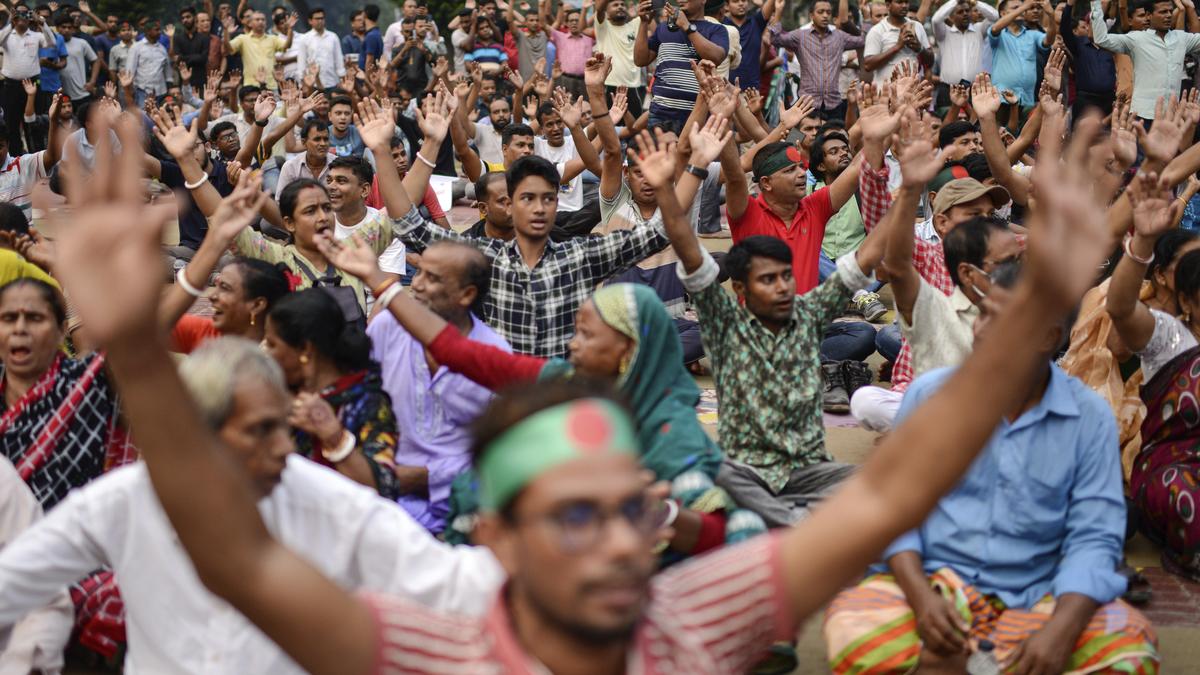
What does Bangladesh’s constitution state about religious freedom?
The Hindu
Desecration of Hindu temples in Bangladesh, arrest of Hindu monk, and Bangladesh's constitutional promises analyzed by expert.
The desecration of Hindu temples in Bangladesh and the arrest of Hindu monk Chinmoy Krishna Das on sedition charges is not only a violation of Bangladesh’s constitutional promises but also a negation of international human rights law. Human rights are not the internal matters of any country and thus, India is fully justified in expressing its concerns about the violation of minority rights in Bangladesh. However, the Bangladesh Foreign Ministry’s reply has been disappointing, indicative of how a country which violates minority rights usually responds.
Also Read:Bangladesh must protect rights of all religious minorities: India
Some 20 million Hindus, Christians, Buddhists and Ahmadiyyas who constitute the minorities in Bangladesh cannot be left at the mercy of the interim government that has not shown any sign of taking concrete steps against the Islamist majoritarian mob except a visit to Dhakeshwari temple by Muhammad Yunus who heads the current political dispensation. The kind of religious freedom the Bangladesh constitution guarantees to its religious minorities must be revisited by the interim government.
Pakistan was created through the divisive and erroneous two nation theory of Veer Savarkar and Muhammad Jinnah. No nation is to be created in the name of religion. Proving the theory wrong within 25 years, Pakistan itself got partitioned with the creation of a new country — Bangladesh. This new country was created not in the name of religion but on the basis of the secular and liberal ‘Bangla’ nationalism. The constitution was adopted by the Constituent Assembly on November4, 1972. The constitution also mentioned that this date corresponds to the 18th Day of Kartick, 1379 B.S.
The preamble of the Bangladesh constitution mentions nationalism, democracy, socialism and secularism as its fundamental principles. Unlike India, their commitment to socialism has been explicitly mentioned and the preamble says that the fundamental aim of the state is to realise through democratic process a socialist society free from exploitation — a society in which rule of law, fundamental human rights and freedoms, and equality and justice will be provided to all citizens.
Though the original Bangladesh constitution was secular, the military dictator Ziaur Rahman in 1977 removed ‘secularism’ from it, and in 1988, General Ershad got Article 2A inserted in the constitution which laid down Islam as the state religion. This new Article says that the state religion of the Republic is Islam and that other religions may be practiced in peace and harmony. This kind of provision is there both in Sri Lanka as well as Bhutan. But the High Court and the Supreme Court struck down the amendment in 2005 and 2010 respectively. The court said that even though Islam is the state religion, the constitution remains secular. In a 186-page judgment, the court observed that the “preamble and the relevant provision of the constitution in respect of secularism, nationalism and socialism as existed on August 15, 1975 [Mujeebur Rahman was assassinated on this day] will revive.” It observed that “omitting secularism, one of the state policy from the constitution, destroyed one of the basis of our struggle for freedom and also changed the basic character of the Republic as enshrined in the preamble as well as Article 8(1) of the constitution.”
Also Read: Targeting minorities: On the state of Bangladesh













